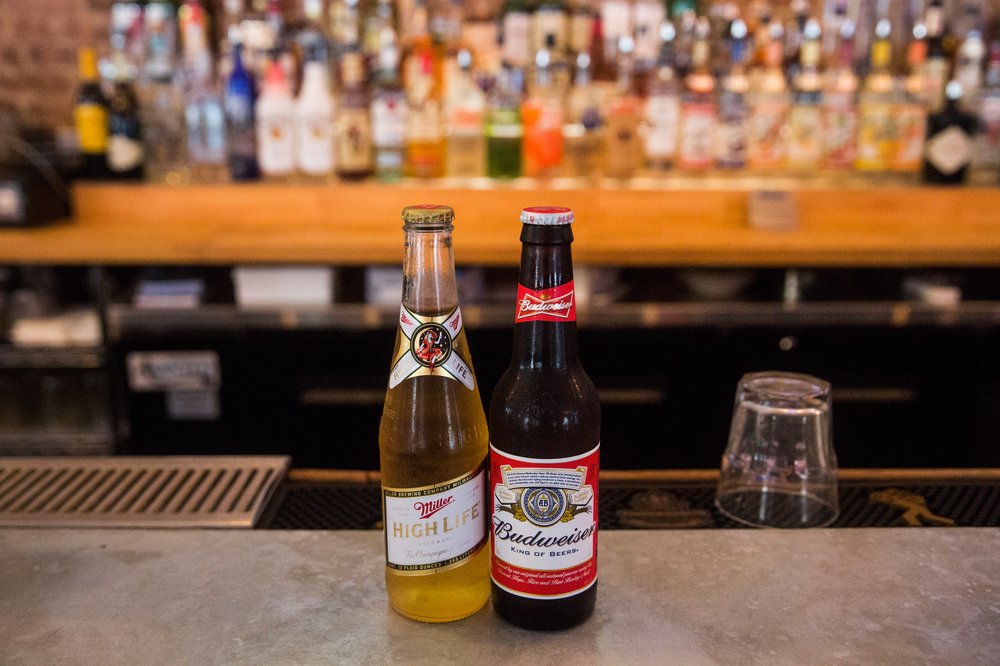'It's been crazy': NYC bar owners brace for chaos amid Trump tariffs
April 10, 2025, 6 a.m.
Bar owners across the city said they felt anxiety and confusion as new tariffs were announced and later delayed.

New York City bar owners say they’re feeling anxious about their industry and uncertain about their inventories amid ever-changing news of President Donald Trump’s tariffs.
Pubs across the city have been bracing for rising costs. On Wednesday afternoon, Trump announced that global tariffs affecting most foreign goods would go into effect in 90 days rather than that day, as previously announced.
But other fees — including a 25% tariff on all beer imports — have already kicked in.
So far, alcohol prices have remained stable, according to six bar owners interviewed for this story. But many said they expect their prices to go up.
“It’s all up in the air. Like, everything,” said Bushwick Country Club owner John Roberts of the tariffs.
Asked if Wednesday’s news changed anything, he said no.
“I’m hoping that all of this will go away and level heads will prevail, cause this just seems like shooting us in the foot for no reason,” said Roberts. “Another headache that small business owners don’t need.”
Abby Ehmann, who owns the Avenue B bar Lucky, said Tuesday that she had to halt a plan to bring in more Canadian whiskey, because tariffs will make it “too expensive.”
“It’s been crazy. Everyone’s just trying to figure out what’s gonna happen,” said Zachary Mack, owner of the Lower East Side’s Alphabet City Beer Company and Governors Island’s seasonal restaurant Taco Vista. Alphabet City sells mostly domestic beer, but once the tariffs go into effect, Mack said he’ll likely have to increase the prices on everything, domestic beer included.
The situation could be even worse for wine sales. “We don’t sell any American wine,” noted Mack.
Imports account for roughly 23% of the American beer market, according to the Brewers Association, a trade group representing American craft beer makers, but 37% of the American wine market comes from other countries, according to research by Rafael del Rey — an economist who specializes in the wine market — that was cited in Forbes.
But even domestic beers aren’t safe from the tariffs, which directly affect imported beer.
“As local breweries are deeply tied to the global supply chain for raw materials and packaging, tariffs could place a significant financial burden on brewers with the potential for higher ingredient and equipment costs as well as increased packaging costs,” said Bart Watson, president and CEO of the Brewers Association. “If these additional costs cannot be easily absorbed by the brewer, they could be passed on to consumers.”
Shanna Nasiri, owner of Williamsburg wine bar With Others, said her wine bar "focuses on sourcing small production wines from France and Italy and helping make wine approachable."
The tariffs, she said, will be especially noticeable for lower-cost wines.
“The biggest impact will be on our more affordable bottles — especially the ones we love to pour by the glass — since a 20% increase on a $16-$20 wine is much more significant than on something higher-end," Nasiri said. "We’re working closely with our distributors and staying flexible, but there’s no doubt it puts pressure on pricing.”
At Cecilia on St. Marks Place, owner Russell Steinberg has preemptively stocked up on a particularly popular imported rosé.
“They just got a big shipment of it in, it’s French from Provence, so we pre-purchased a little swath of them and for a small fee they’ll store them at the location so I don’t have to have them all at my restaurant," Steinberg said. "So that was one evasive maneuver."
The tariffs come at a particularly tough time for the industry, where many businesses are still recovering from the coronavirus pandemic and reeling from inflation.
“I’ve been here long enough to have been through 2008 and COVID, and I know a couple of bad months can be the difference between a business making it or not,” said Mack. “I'm anxious.”
NYC shop owners ‘terrified’ as many brace for price hikes and economic uncertainty Carrie Coon on the 'White Lotus' finale, commuting to Thailand and learning to say no